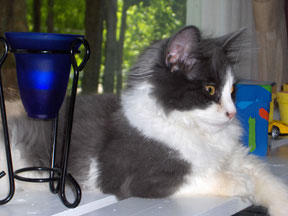Okay, I'm in a
mood this morning. There will be ranting.
+
Goddammit, words have
meanings. Sometimes those meanings are flexible, and sometimes they're rigidly circumscribed. Sometimes any of a number of words will do: other times, only one word properly fits a given situation. Why can't writers and editors consistently figure out which is which? Isn't that their
job?
Here's a paragraph from a
Slate.com article about two new tattoo-themed reality shows:
Miami Ink has this gem to offer: Before inscribing a sentiment on your flesh in perpetuity, be sure to give it a quick proofread. One Italian-American client asks for the Italian words "per sempre" (forever), only to submit a misspelled version reading "pre sempre," which the head tattoo artist, Ami, promptly inks onto his forearm. To me, this was a perfect tattoo joke: to be stuck forever with a tattoo representing your own flawed idea of "forever"! But Ami takes the screw-up very seriously indeed, and with some serious darkening and widening of the two inverted letters, "forever" is salvaged from the ash heap of history.In the last sentence, "inverted" is not, in the most technical sense, wrong, because one meaning of it is "reversed the order of"; nevertheless, it's a very poor choice, because its primary meaning--the one virtually everyone thinks of first--is "turned upside down". The word she was surely searching for, the one her editor should have supplied even if her brain couldn't, is "transposed", the primary meaning of which is "reversed or otherwise altered the order of".
+
What exactly does "pray" mean, anyway? I know the literal meanings of the word, and I know its provenance (it's from Latin, of course, little changed). What I don't understand, at all, is the point of it.
If someone believes in a deity, and prays to that deity to help them be a better person--"Please help me not lose my temper with that useless jackass in accounting--oops"--then I can't see any real problem with that.
This Associated Press wire story, however, is the sort of thing I have a problem with:
Pope prays for God to stop terrorists
By Nicole Winfield, Associated Press Writer | July 24, 2005
LES COMBES, Italy -- Pope Benedict XVI prayed Sunday for God to stop the "murderous hand" of terrorists, stepping up his condemnation of the recent attacks in Europe and the Middle East blamed on Islamic extremists.
...
"While we grant to divine goodness the dead, the wounded and their dear ones -- victims of such acts that offend God and man -- we invoke the Almighty to stop the murderous hand of those who, driven by fanaticism and hatred, commit such acts and ask him to convert their hearts and minds to reconciliation and peace," Benedict said.Now; would someone please explain to me exactly
what the hell that is supposed to mean?
Joseph Ratzinger, aka Pope Benedict XVI, professes to believe in an omnipotent, omniscient, omnibenevolent deity. The creed of the Catholic church to which he belongs states that as Pope, he is that deity's chosen representative on Earth. Therefore, in that belief system, this is unquestionably the man with the most direct pipeline to God.
So what is this very public prayer meant to accomplish? What could the point of it possibly be? To tell God something he already knows? To ask God to do something he hasn't done yet and perhaps has decided not to do? To placate a frightened populace by assuring them that God's right-hand man is on the job?
The mere existence of the prayer suggests that Mr. Ratzinger's deity is at least one of three things: 1)
not omnipotent, as he requires the spiritual energy generated by the prayers of a number of his subjects before he can or will do anything; 2)
not omniscient, because he doesn't seem to have noticed that terrorists are afoot and requires prayers to bring this to his attention; or 3)
not omnibenevolent, since he either wants the terrorists to continue doing what they're doing or won't stop them unless enough people beg, plead, and pule about it.
I think Ambrose Bierce got it right when he defined "pray" as "To ask that the laws of the universe be annulled in behalf of a single petitioner confessedly unworthy."
+
Okay, I'm over that for the time being. Now: "pule". Great word. As soon as I wrote it another word popped into my head, and I thought, "Hey--'pulex irritans' is the Latin name for the human-flea (as opposed to the cat-flea, 'Ctenocephalides felis'). There can't be any relation, obviously." And obviously there isn't. "Pulex" is straight-out Latin for "flea", whereas "pule" comes to us from the French and is almost certainly an imitative word, as is its synonym "whine".
"Ctenocephalides", by the way, means "comb-headed". Since you were probably wondering and all. Does the cat-flea have a comb like a rooster? Couldn't tell you, but it's amusing to think about.


